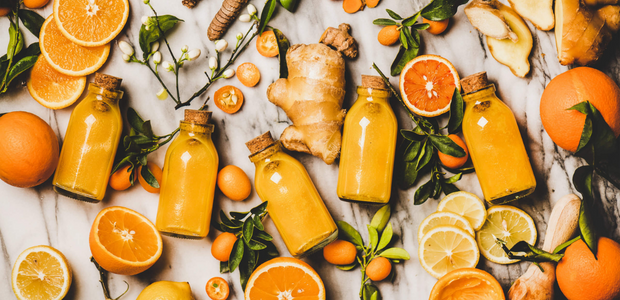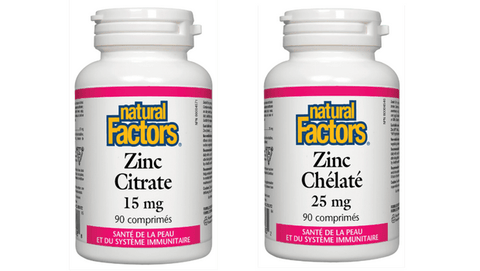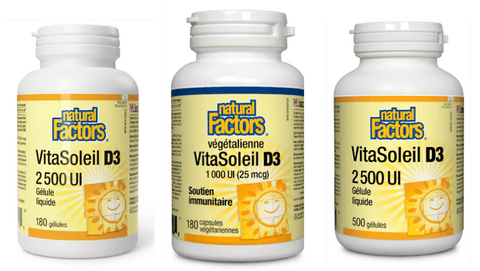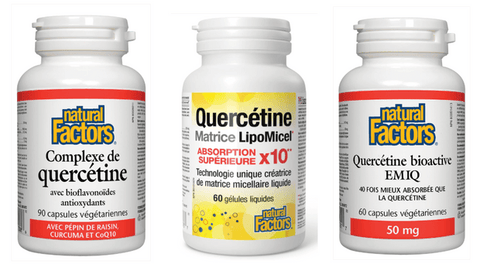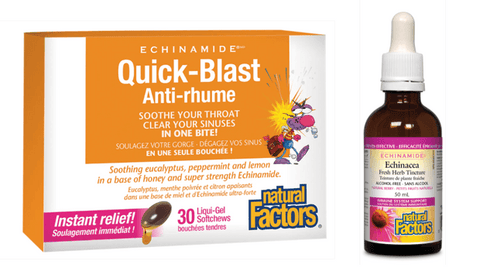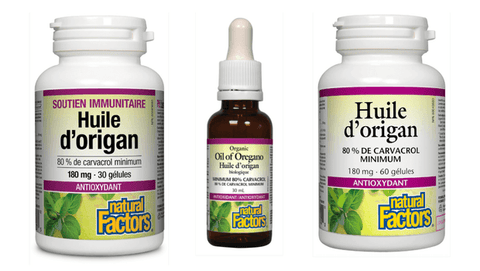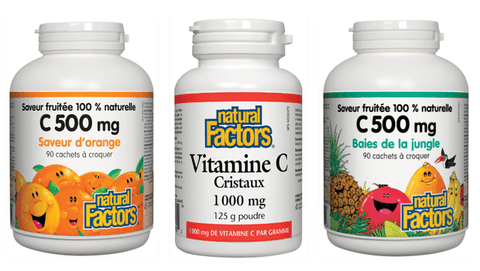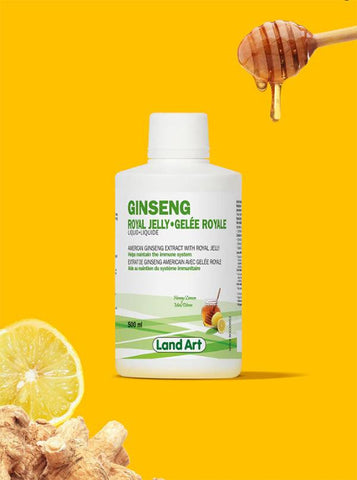First of all, we don't all start out equal in terms of immunity. For example, an elderly person and/or someone suffering from a chronic illness is more fragile than a young, healthy person.
There are a large number of risk factors over which we have a certain amount of control to maintain a strong immune system, such as our lifestyle, starting with our diet, our quality and quantity of sleep, our daily stresses and so on. There are also those we have no control over, such as age, gender, blood type, genetics, etc. Of course, the whole environmental aspect also plays an important role in our immunity..1, 2
Inflammation and the immune system
Inflammation is a normal reaction of the human body. When the immune system is functioning optimally, inflammation is the reaction that starts the healing process. It is the immune system's initial response to an injury or irritation caused by a foreign substance.
The chronic inflammation encountered in osteoarthritis leads to oxidative stress, which forms free radicals and destroys connective tissue and collagen. This is an inflammatory disease, also known as autoimmune disease. In sufferers, the immune system, which is normally protective, attacks its own tissues.
Inflammation management is therefore of the utmost importance in order to continue supporting the immune system..1, 2, 3
Antioxidants and free radicals
This balance between free radical production and protective antioxidants has enabled our survival for thousands of years. Free-radical-producing stresses have been identified as environmental pollutants, preservatives, fatigue, chronic infections, excessive sunlight, parasites, bacteria, viruses, stale air in our homes or offices, and so on. The consequences of too many free radicals affect our cellular health. This is when the degenerative symptoms associated with disease and aging appear. Antioxidants are multi-electron molecules that can be easily released by donating electrons to free radicals, thus neutralizing their unstable effects and rendering them harmless..1, 2, 3
10 ways to boost your immune system
1) Zinc
Zinc is arguably the star of the immunity minerals. It's a must-have, since it's found in every cell of our body. It is also essential to three of our senses: taste, smell and sight. What's more, it helps our immune system function properly, produces energy, supports bone development and maintains healthy skin.
Zinc is a mineral that can easily be lacking, as it interferes with other nutrients..6
- Zinc-rich foods: animal products such as red meat and offal (e.g. liver and gizzards), poultry, fish and seafood, cheese, sprouted cereals, seeds (pumpkin) and nuts, brewer's yeast, mushrooms, etc.
- Zinc supplementation: Natural Factors offers zinc in 15 mg and 25 mg
2) Vitamin D
La vitamin Dalso known as the "sunshine vitamin", has a direct impact on our mood. And a deficiency of the latter causes a multitude of health problems including osteoporosis, heart disease, cancer, symptoms of viral infections, etc.
Vitamin D is a remarkable ally in supporting the immune, nervous and neuromuscular systems, and acts as an antioxidant throughout the body. According to data, the majority of people living in the northern hemisphere of the planet are deficient in vitamin D due to the lack of light during winter.
It is therefore essential to take a vitamin D supplement supplement to cover our needs, knowing that diet alone (especially oily fish, eggs, fortified dairy products and offal) is not enough.
Have you heard of seasonal depression? It's a form of depression that's directly linked to the changing seasons and occurs every year.
Symptoms worsen as autumn progresses, and last until spring. This is due to the reduced hours of sunlight in autumn and winter, which causes a drop in serotonin, a neurotransmitter that helps regulate our mood.
Serotonin also triggers our production of melatonin, the hormone that helps us fall asleep and affects our sleep cycles. Poor sleep means fatigue, which accumulates over time. Nothing to help your mood.8, 9
3) Quercetin
Visit quercetin is a member of the flavonoid family, which comes specifically from the brightly-colored plant pigments found in fruits and vegetables. The foods richest in quercetin are: capers, yellow peppers, cocoa powder, red onions, blackcurrants and apples with skin (organic), among others..7, 8
The term 'antioxidant' is often misused without any real understanding of its protective function at cellular level. Let's start by explaining what an antioxidant is.
When we breathe, oxygen is used as fuel to produce chemical energy, in the form of a very important molecule called ATP (adenosine triphosphate). As this fuel is metabolized, it creates quantities of "waste" known as "free radicals". Free radicals are highly unstable molecules, as they possess a "single" electron which triggers destructive chain reactions that damage the cell..7, 8
According to numerous studies, quercetin supports good health, including the cardiovascular, immune, osteoarticular, circulatory and blood systems. :
- Inhibiting oxidation of low-density lipoproteins (LDL cholesterol)
- Modulating inflammatory markers (arthritis)
- Supports normal platelet activity
- Inhibiting certain cold and flu viruses
- Controlling histamine production (allergies, allergic rhinitis)
- Protects capillary integrity7, 8
Quercetin is a bioflavonoid (antioxidant) that is not easily absorbed. Natural Factors uses a technology that makes quercetin absorbable..7
Available quercetin supplements:
4) Echinamide
Do you know the Echinamide range line from Natural Factors? It's a very interesting product, as it contains Echinacea and fresh plants whose combined ingredients and properties are recognized for fighting viruses that attack the upper respiratory tract.
Echinacea can act preventively or help support your immune defenses. This North American plant contains a variety of active ingredients that promote the action of white blood cells, stimulate antibody production and orchestrate immune defenses.
Echinamide and other accompanying plants :
- lomatium (Lomatium dissectum) (root part): the properties of lomatium are known for their anti-inflammatory, antimicrobial and antioxidant effects to support respiratory problems and strengthen the immune system.
- Astragalus (Astragalus menbranaceus) (root part): an excellent immune system stimulant, rich in antioxidants, anti-stress and hepatoprotective (protects the liver).
- Reishi mushroom (Ganoderma lucidum) (flesh part): Has been used for centuries in Chinese medicine for its many properties. Considered a Qi tonic (vital energy), it is reputed to stimulate the immune system, combat fatigue, treat insomnia and hypertension, etc.
- Licorice (Glycyrrhizza glabbra) (root part): Stimulating the immune system, licorice root can above all soothe sore throats and coughs, as it helps thin mucus. It inhibits the growth and pathological effect of many viruses. It can also help reduce digestive disorders such as bloating, flatulence and belching. Laboratory studies show in vitro that its flavonoids kill the Helicobacter pylori bacteria involved in stomach ulcers..11, 12, 16
The Echinamide range range is presented in liquid form, i.e. as a mother tincture, in capsules, lozenges or syrup.
5) Oregano oil
Organic oregano oil from Natural Factors has powerful antimicrobial properties. Its active ingredient, "carvacrol", which is responsible for oregano's activity, is present in 80% of its natural concentration. This wild plant is hand-picked, steam-distilled without chemicals and presented in liquid form.
While oregano is renowned for its exceptional anti-infectious efficacy, it's worth pointing out that it is also a powerful stimulant of natural defenses, providing intense revitalization for any organism weakened by infection..13
The many benefits of oregano :
- Broad-spectrum anti-infectives (sinusitis, bronchitis, influenza, laryngitis, urinary tract infection, cystitis, parasitosis, tourista, boils, abscesses, genital herpes, Crohn's disease, etc.).
Natural Factors Oregano Oil comes in the following forms a liquid form or capsule form.
6) Vitamin C
Vitamin C is an essential, water-soluble nutrient naturally present in many fruits and vegetables. This vitamin performs many functions in the body, such as supporting the immune system, aiding wound healing, maintaining skin and bone health, contributing to collagen formation and tissue growth and repair. Vitamin C is also a powerful antioxidant, helping to cleanse the body or rid it of harmful substances.
When the body is fighting an infection, it is important to increase vitamin C dosage on a daily basis. Taken regularly, it helps reduce the duration and severity of cold and flu symptoms.
Natural Factors vitamin C is available from chewable tablets in a variety of flavors, in tablets, in capsules or powder.14, 15
A good immune system is vital!
7) Black cumin oil
Black cumin oilalso known as "black seed oil" or "nigelle oil", is native to the Mediterranean. It has been used for over 2,500 years. Mohammed is said to have said that "it can cure anything except death".5
Black seed oil is used on the skin as a cosmetic oil for various skin problems, but it is also an ally when taken internally. In fact, it supports immunity by preventing various infections and is useful in the following conditions:
- Colds/flu
- Respiratory and ENT disorders
- Other microbial infections
- Asthma
- Allergy
- Parasitosis
- Candidiasis
- Cholesterol
- Insulin response, diabetes prevention, digestive and gastric disorders
- Liver disorders
- Overweight5
Where appropriate, a different treatment is indicated according to the conditions presented.
8) Vitamin D
Vitamin D is, strictly speaking, a hormone, since its main source is a synthesis by the body following exposure of the skin to the sun (without sunscreen). It's only when exposure to the sun is inadequate that we need a vitamin D supplement.2, 3
Obviously, exposure to the sun is inadequate if we spend all our time indoors during the summer and/or if we hardly ever expose ourselves to the sun without slathering on sunscreen. And for us, a people living north of the 40th parallel, supplementation is essential in winter.2, 3
Its main role is in calcium metabolism. Vitamin D is therefore essential for good bone function, but it is also closely linked to the regulation of immunity and the inflammatory response. In fact, by binding to certain receptors on the cell, it finely regulates the production of interleukins by T lymphocytes and immunoglobulins by B lymphocytes. It also controls the differentiation of monocyte precursors and modulates cell proliferation.3
Vitamin D also plays a role in preventing insulin resistance, obesity, metabolic syndrome, autoimmune diseases and cancer.2, 3, 4
The Land Art company offers a vitamin D derived from lanolin. It comes in liquid form in a base of organic sunflower oil with rosemary extract and orange essential oil to maximize shelf life and absorption.4
Always take vitamin D with a meal to optimize absorption. In fact, it's a "fat-soluble" vitamin, meaning it's soluble in fats.2
9) Ginseng and royal jelly
Ginseng and royal jelly formula formula combines nourishing and stimulating molecules. This Land Art formula would be very interesting for people under stress, especially women, as there is an affinity between royal jelly and the female hormonal system..6
In fact, royal jelly is nothing less than the honey of queen bees, which live for several years, as opposed to a few weeks for nurse bees.6
Its nutritional composition is rich in nutrients: proteins-carbohydrates-lipids, vitamins, minerals and trace elements (especially B vitamins, which are essential for proper nerve function and hormonal metabolism), which give it its therapeutic virtues.6
A number of in vitro animal studies have highlighted royal jelly's immunostimulant and immunomodulating properties.6
Land Art offers it in combination with panax ginseng which is recognized in Chinese medicine as a source of "vital energy". In fact, it's the ginseng of tired, overworked and stressed people who, in such conditions, can easily come into contact with microorganisms and become ill. As a good adaptogen, it promotes vitality, calm and "wisdom" of the spirit..6
Human studies confirm its long-standing traditional use by Asians. Indeed, studies confirm a reduction in the number of respiratory infections and even in the severity of symptoms..6
10) Vitamin C
Vitamin C is fairly common and well-known. Most mammals can synthesize it, but not humans, who must therefore ensure a constant dietary intake of vitamin C..3, 8
According to Dr. Jean Seignalet, vitamin C is 4 times less abundant in our modern diet than in the ancestral diet.9 What's more, it is sensitive to heat and even freezing.2, 8, 9
It plays a number of roles, including
- Essential for collagen synthesis (25% of our body's tissues)2, 3, 8
- Improves intestinal iron absorption3, 8
- Helps produce stress hormones (catecholamines) and certain neurotransmitters
- Stimulates the immune system2, 8
- Helps the liver break down histamine2
Small doses (250 mg to 1 g per day) can help prevent infections and reduce symptoms in the event of infection.2, 8
This is achieved by helping the immune system to function properly, i.e., by increasing phagocytosis by neutrophils and macrophages. Like "Pac-Mans" eating microbes.2 It should be noted here that there is still some uncertainty on this subject, and several studies are contradictory or inconclusive.3, 8 Research over the next few years may tell us more.
The right reflexes to boost your immune system
1. Thectivity
We can't stress this enough: physical activity is a panacea. Thirty minutes of physical activity a day, even in cold winter weather, is essential for maintaining immune function.1
2. Nutrition
Of course, diet will always remain the most important factor; we must never think that a good supplement can replace a healthy, balanced diet. We'll be looking for food quality, organic produce, freshness, lots of color, and light cooking or not overcooking to maximize our intake of vitamins and minerals.
A constant protein intake of around 1 gram per kg of body weight per day is essential for proper immune function. As the soldiers of the immune system are mainly made up of proteins, our body absolutely needs them.1, 3
3. Sleep
Our entire system needs to rest. Night-time rest is essential for good immunity, as well as for the proper assimilation of nutrients in the diet.1, 10
When sleep is good, everything is good!
4. Manage stress
Chronic, prolonged stress and the production of cortisol by the adrenal glands are known to lower immunity.1, 10
Conclude on the subject of the immune system
In conclusion: we take care of ourselves and our immunity through a healthy lifestyle adapted to our needs. And don't forget to take life with a grain of lightness: smile, sing, move, cook...!
If necessary, choose a supplement depending on the moment and your objectives.
Don't forget that, despite your best efforts, you may still catch certain infections. This doesn't mean you're not doing the right thing; just let your immune system "re-train" itself for battle by giving it the tools it needs.
Stay healthy!
The team at La Boite à Grains
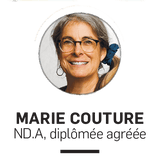
References :
- Liesse Véronique, Lefief-Delcourt Alix, Special immunity'' food', Leduc Éditions, 2020, 297 pages.
- Joyeux Pr. Henri, Joyeux Jean, Manger mieux et meilleur de 0 à 100 ans (in French only)éditions du Rocher, 2017, 326 pages
- https://www.catie.ca/fr/treatmentupdate-205/linflammation-et-ses-consequences
- Baudoux Dominique, Aromatherapy Biochemistry of molecules Pharmacological properties Therapeutic indicationsDunod, 2017, 534 pages.
- https://www.science-et-vie.com/corps-et-sante/covid-immunite-groupe-sanguin-pourquoi-certaines-personnes-ne-lattrapent-pas-64449.html


